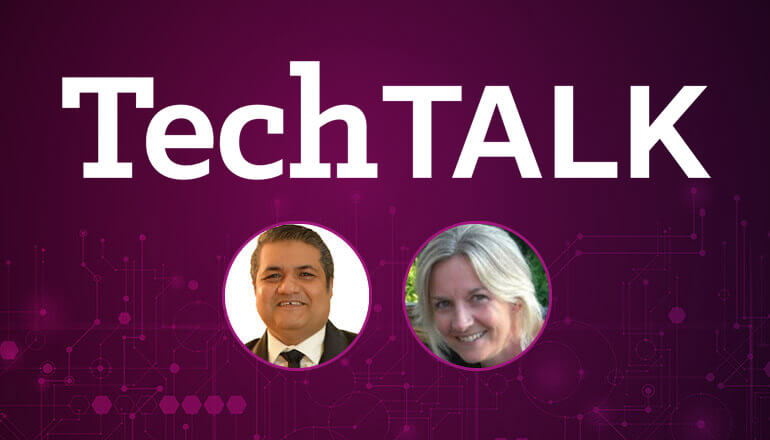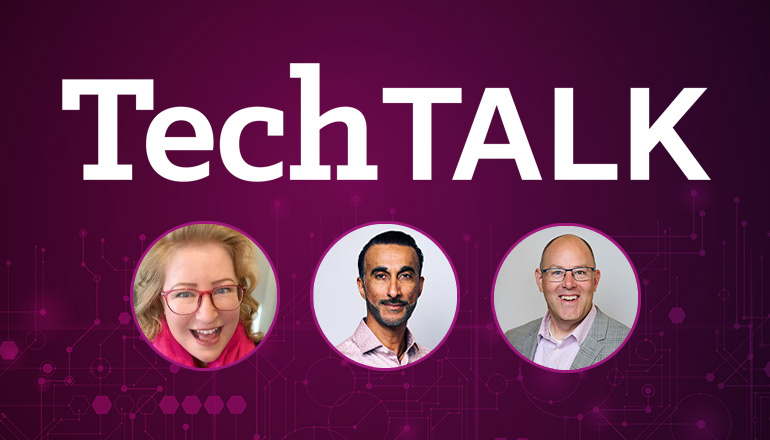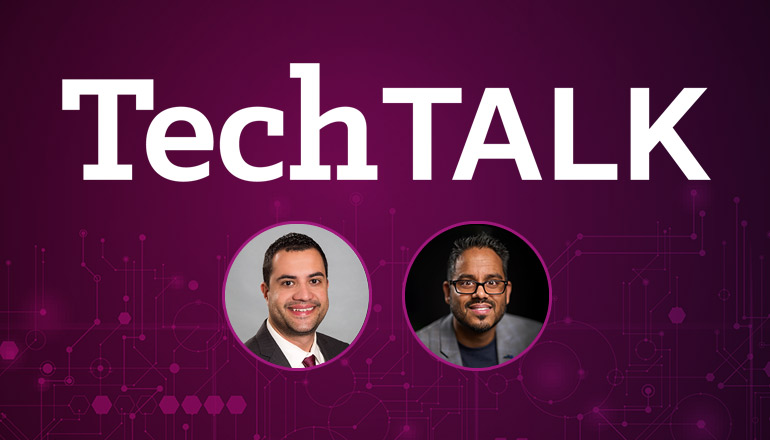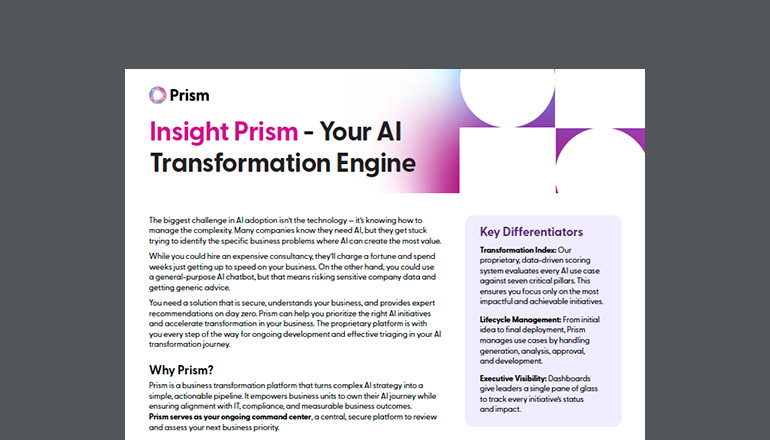Transcript of audio:
TechTalk | IT Industry Disruptions: Exploring Opportunities for a Dynamic Data Center Landscape
[ERIN]
Hello, and thank you for joining us for another episode of Insight's "Tech Talk". I'm Erin Hazen, Client Solutions Executive here at Insight. And today I am thrilled to be joined by Chris Kuppek, Sales Leader at Dell Technologies. Thanks so much for being here with us, Chris.
[CHRIS]
Well, thank you for having me. I'm quite excited to be here.
[ERIN]
Really, really appreciate your time. So we know that there are significant disruptions in the IT industry, but with these disruptions we are seeing a surge in opportunities, from cloud efficiencies to AI driven operations. And this paves the way for a dynamic data center landscape that promises to revolutionize how we manage and secure our data applications. So, Chris, I really want to talk about this with you. Are you ready to dive in?
[CHRIS]
Oh, absolutely.
[ERIN]
Awesome. So maybe let's start with an overview of the current disruptions and opportunities that we're facing within the IT industry.
[CHRIS]
Yeah. So, you know, at a high level every year, Dell kind of, we release content we set the themes for our sales folks right across the company. And you know, this year we've come out with five major, we'll call 'em mega trends with, with respects to where to find the opportunity and the disruptions that our customers are facing. To no one's surprise, number one, is obviously artificial intelligence, right? That is probably one of the most impactful technologies that humankind is probably ever seen, right? We're still in its very early stages, but that's number one. Number two is all about developing those multi-cloud strategies for our customers. There's a proliferation and of adoption in the cloud, but now it's about how do you make it all work seamlessly together and optimizing the costs. Artificial intelligence is driving a massive surge in data growth and usage. So that's a mega trend that we're seeing, which lends itself then to just overall energy consumption.
[ERIN]
Yeah.
[CHRIS]
And we wrap all of that up around, you know, data protection and security, right? Once you've adopted artificial intelligence, once you've deployed a multi-cloud strategy, you know, how do you protect yourself from that evolving threat landscape?
[ERIN]
Yeah and feels like almost a little bit, like we're kind of a little cart before the horse, all of this new stuff, all of this exciting stuff and everybody's trying to catch up to figuring out how to make it all work together. So maybe talk to me a little bit about that AI explosion and how Dell is working through it.
[CHRIS]
Yeah, well, I mean, take Dell off the table for a second and just a Chris Kuppek opinion, like it's one of the most exciting technologies that I've seen, right?
[ERIN]
Totally.
[CHRIS]
I mean, ChatGPT was crazy. Now you have Gemini from from GCP and I don't know if you've seen the Sora technology that came out from OpenAI, which is text to video.
[ERIN]
I haven't. Oh.
[CHRIS]
It's worth the YouTube the YouTube time investment, because it's rather incredible. But, you know, the reality is AI is going to change the landscape. For us personally, as employees, for consumers, but also for, you know, our customers, right? And we've run a couple of surveys and about 81% of our customers expect that artificial intelligence is going to transform not their business, but their actual industry. Right?
[ERIN]
Yes.
[CHRIS]
So it's, you know, to say that it's impactful is, well it's a bit of an understatement.
[ERIN]
Totally.
[CHRIS]
But there's a lot of inherent risks that come around with artificial intelligence. You talk about things like, you know, protecting intellectual property, not having secure data kind of leak. There's co compliancy violation. There's ethical implications as well that come into that, you know, over time we're helping our customers, you know, navigate through and, you know, I guess ultimately pick which directions they want to start with and what projects they want to deploy with first.
[ERIN]
Yeah. They're looking for guidance, right? They're looking for that support, because of course they know it's not if, it's when, this has to-
[CHRIS]
Oh yeah, yeah.
[ERIN]
Everyone has to be part of it. So they're looking to our trusted advisors like Dell and Insight, right?
[CHRIS]
Exactly. And at Dell we boiled down, you know, the way we help our customers around AI, we boil it down to four key areas, right? We talk about embedding AI in our products, right? So taking, for example, the softwares that now span, you know, our entire portfolio and kind of overlay a certain level of intelligence on top of them. We talk about running AI on our products, and that's really where the rubber hits the road with respects to helping our customers. So taking their AI initiatives and now standing that up on our technologies, we are focusing a lot on integrating AI for Dell customers. What that basically means is, you know, eating our own dog food for lack of a better term, right? It's how is Dell integrating artificial intelligence into the way that we do things from a day to day perspective.
[ERIN]
Right.
[CHRIS]
But many customers, you know, our sales teams are, you know, getting ramped up on Microsoft Copilot and those types of things, like how are they pulling or augmenting productivity for the sales force? And the last one is, I think, an important one, right? We believe that there's no one company that can have a monopoly on artificial intelligence. So the last pillar is really about building an open ecosystem with our partners, right? And those partners are the obvious ones. It's the Microsofts of the world, but it's also, you know, the Nvidia, the AMDs, and the Intels as well.
[ERIN]
Right. Right. I do believe 100% the better together story is so necessary when we are taking our clients through these really complex and new decisions. This is new for everybody, right? We're kind of all learning as we go along. (laughs)
[CHRIS]
Yeah. Yeah.
[ERIN]
So maybe dive with me a little bit into what the multi-cloud strategy looks like for clients and Dell.
[CHRIS]
Yeah. So this one's actually near and dear to my heart.' Cause this is where my team focuses mostly with our customers. And well, think about it, right? Most of our customers have, many have adopted cloud first strategies. Now that doesn't automatically mean public cloud, right? That could mean, and it includes public cloud, but it also includes the on-premises private cloud as well. Many customers are running more than one cloud, right? So they could have Microsoft, they could have Dell, they could have AWS and I think where the biggest challenge, the biggest challenges that we're seeing is how do you kind of interconnect and intertwine all of it together so it becomes a cohesive strategy versus just different, you know, different operating silos,
[ERIN]
Right.
[CHRIS]
So at Dell, we have invested a lot of time to essentially make our intellectual property very cloud friendly, right? And we've come up with this notion of cloud to ground and ground to cloud.
[ERIN]
Okay.
[CHRIS]
And to keep it really simple, it's, you know, we've adapted our intellectual property and technologies to be deployed within the hyperscalers, like Microsoft and AWS as an example. And we've done the flip side, we've worked with those, those partners as well. And we've co engineered solutions to allow our customer to take their cloud strategy or their cloud IP and now bring it on premises.
[ERIN]
Right.
[CHRIS]
Inherently, you know, enabling them to benefit from both sides of the strategy, but also simplifying that operating ecosystem.
[ERIN]
And so necessary, because I know that even in my own experience, I've got clients who did exactly what you said all the way to cloud, realized that wasn't exactly what they needed. They needed this sort of like mix of solutions that would work for their compliancy, governance, regulation, all of those things, right? So, I love that Dell has focused on this to support clients through that multi-cloud strategy. And you've practiced, right? That's always really important for clients. They can be like, "Oh, this, I'm not the Guinea pig here." This has been done already for lots of clients ahead of them. You know what I mean?
[CHRIS]
Yeah, 100%. And I mean, you know, obviously the Insight family is very familiar with our Apex brand, right? That is really the brand that drives a lot of these cloud technologies and the cloud portfolio for Dell. So, we have, you know, the co-engineered Apex solutions for Microsoft, the same thing for Red Hat, but it's also a question of transforming the way in which our customers also invest in technology, right?
[ERIN]
Right.
[CHRIS]
So it's how do we potentially do away with those large capital expenditures and bring about an alternative for customers where they can consume or rather pay for what they can consume rather than, you know, buying the whole kit and caboodle as they say upfront.
[ERIN]
Right. It's just so, and you're right, like that strategy, and actually this leads into the next topic so smoothly, because that strategy is necessary as the consumption of these things changes, so does the model that businesses have to follow, right?
[CHRIS]
Yeah.
[ERIN]
So, let's talk about that data growth and usage, right? Like we're seeing whew, things are getting a little crazy out there.
[CHRIS]
Yeah. And well, it's unbelievable. And that artificial intelligence drag is I think, something we've never seen before.
[ERIN]
Right.
[CHRIS]
So, again, I'm forgive the statistic, but I think it's by 2027 we'll see something like 221,000 exabytes of capacity globally, which is crazy, right? So from our lens, when we start talking about data growth, well, first of all, it's how you manage that data, right? So again, if you look from a portfolio perspective, we have a lot of different storage technologies, a lot of different server technologies. We work with our customers to essentially translate their workload and data requirements into the appropriate landing zones. So step number one is putting the data on the right type of solution.
[ERIN]
Exactly.
[CHRIS]
We have intellectual property and software that allows us to, you know, simplify the management across multiple platforms, which has also helped out enormously from a customer perspective. And we've developed technologies that, you know, I talked about consumption, there's also technologies that come into play that enable our customers to scale and grow in more, in smaller increments, right?
[ERIN]
Right.
[CHRIS]
So I think that had been a benefit for them as well.
[ERIN]
[CHRIS], let's talk a little bit about the evolving threat landscape. Of course, this is a huge topic for clients and for Dell and insight collectively.
[CHRIS]
Yeah. So, you know, when we think about security, right? We think about often like defending ourselves against an attack, right? And again, to tie back to artificial intelligence, the attack surface is much larger now, than I think it's ever been, right?
[ERIN]
Ever. Yeah.
[CHRIS]
So, from a Dell lens, we, I kind of, I don't want to say I coined this, but I kind of look at it from the perspective of, well, how do you detect the threat? How do you defend the threat? But then more importantly, it's how do you recover from the threat?
[ERIN]
Oh sure, yeah, absolutely.
[CHRIS]
So, the conversation with customers is really you are going to get hit, right? And it's how do you recover when that happens? Not if it happens.
[ERIN]
Right.
[CHRIS]
And that's where our, you know, we talk about Cyber Sense, which is one of our detection softwares. We talk about Power Protect, which is our data protection portfolio, but we talk about how Power Protect extends from not only backup, but into, for example, the idea of air gapping the data, but also vaulting the data and keeping it completely separate from the main network, so that when it does come time to actually recover, you can do so quickly, effectively, and without impacting the overall business.
[ERIN]
This is such a fascinating topic and such, there's so much to talk about, Chris, I feel like we could go on for another hour at least. And of course I have a million questions that I would love to chat with you about. But I really appreciate you giving us a high level overview of the Dell technologies and investment in the future here that we've been working on together. Thank you for your insights today. It's been an exceptional conversation about how Dell and Apex and Insight can help businesses overcome the challenges of multi-cloud with a simpler path to digital transformation. So thank you so much, Chris, for your time. Really appreciate it.
[CHRIS]
Well, thank you so much for having me. It was awesome to be here.
[ERIN]
So grateful. And you can learn more by clicking on the link in our show notes. And that'll take you to the Dell Apex partner page on insight.com. And while you're there, take a moment to check out our digital magazine, ""The Tech Journal", for more inspiration and insights on the future of business and technology. On behalf of the insight team, thank you again for spending some time with us today. My name is Erin Hazen and I look forward to Tech Talking again with you soon. Thanks again. Have a great day.










